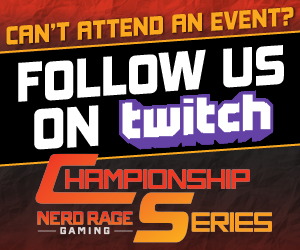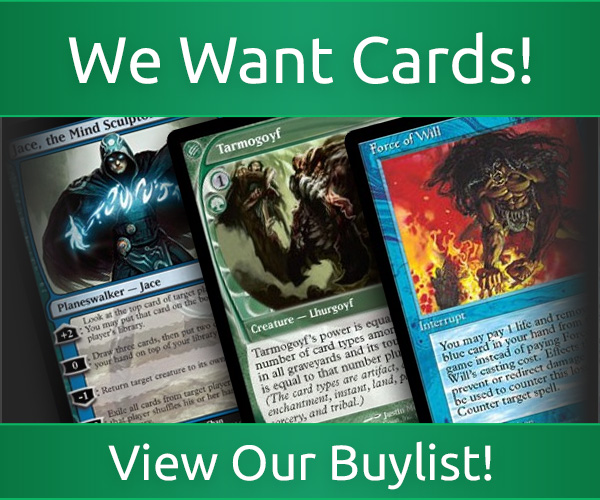Max Kahn: Everything You Need to Know About Aether Revolt
Hi again,  and welcome to another installment of Everything You Need to Know, this time featuring the expansion of Aether Revolt. There’s a lot to go over, so let’s get into it.
and welcome to another installment of Everything You Need to Know, this time featuring the expansion of Aether Revolt. There’s a lot to go over, so let’s get into it.
First, the returning mechanics from Kaladesh are Energy and Vehicles. For simplicity’s sake, let’s assume that you’re already familiar with those abilities.
The first new mechanic from Aether Revolt is Revolt, a new ability word. Revolt is found on both permanents and spells, and gives you a bonus if a permanent you control left the battlefield this turn. So, let’s take a look at what will and will not turn on revolt.
| Will turn on revolt: | Won’t turn on revolt: |
|---|---|
| A creature you control dies in combat. | A spell you control is countered. |
| An opponent exiled your creature with Incendiary Flow. | A spell you control resolves. |
| You crack a fetchland. | Paying Energy costs |
| A token you control leaves the battlefield; A creature you control is returned to your hand; You blink a permanent you control with Felidar Guardian. |
The other new ability from Aether Revolt is Improvise, which works very similarly to Convoke from Ravnica and Magic 2015. Improvise gives you an additional way of casting your spells without using mana. Cards with Improvise can have each generic mana in their casting cost paid by tapping an untapped artifact you control rather than paying mana. While on the surface, it seems identical to Convoke, there are two key differences between the two mechanics.
| Convoke | Improvise |
|---|---|
| Tap creatures to cast the spell. | Tap artifacts to cast the spell. |
| Can reduce the colored and generic mana costs of a spell. | Can only reduce generic mana costs of a spell. |
There are a few more ‘intricate’ rules notes about improvise that I’d also like to make sure you know.
– Multiple instances of Improvise on the same spell are redundant.
– If there is an effect that makes your spell with improvise cost more, such as Thalia, Guardian of Thraben, you can use Improvise to pay for that additional cost.
– Improvise can’t be used to pay for anything other than the cost of the spell. For example, if someone casts a Metallic Rebuke targeting your spell with Improvise, you cannot tap additional artifacts to pay for the (3) that Metallic Rebuke requires.
– For spells with Convoke, you weren’t able to, for example, use the mana ability of Birds of Paradise and tap the Birds for convoke; you would have to choose one. Improvise works the same way. So, your Moxen and Cultivator’s Caravan can’t do double-duty improvisation.
Now, that we’ve gone over the abilities of Aether Revolt, let’s take a look at some of the cards on an individual level.
Aethergeode Miner
– If Aethergeode Miner was in combat when you activated its ability, it will no longer be in combat when the creature is returned to the battlefield.
Aethertide Whale
– If you want to try to kill the Aethertide Whale, you can respond to the ETB ability with a kill spell before your opponent gets the six energy. However, if they have four or more energy before Aethertide Whale resolves, this trick won’t work.
Aetherwind Basker
– The number of energy you get is based on the number of creatures you control when Aetherwind Basker’s ability resolves.
Aid from the Cowl
– You may always choose to put the card on the bottom of your library, even if it is a permanent card.
Baral, Chief of Compliance
– Baral’s triggered ability will be put onto the stack after your counter spell resolves. If your counter spell becomes illegal (such as, it was countered by another spell), Baral’s ability won’t trigger for that spell. It actually checks to see if that spell countered another spell.
– Baral’s ability will only trigger if the card has the word ‘counter’ in its text. Cards like Mindbreak Trap, for example, will not trigger Baral.
– Returning an artifact creature to its owner’s hand with Baral’s Expertise only counts as one of the three targets.
– You may cast one of the artifacts or creatures returned to your hand with Baral’s Expertise during the second part of the spell.
Caught in the Brights
– Caught in the Brights doesn’t work too well on your opponent’s vehicles. If you cast Caught in the Brights targeting one of your opponent’s vehicles, the Aura will fall off when the Vehicle ceases to be a creature at the end of the turn.
Chandra’s Revolution
– You must have a legal creature and a legal land to target when casting Chandra’s Revolution.
Cogwork Assembler
– Cogwork Assembler’s activated ability can target itself. Only seven mana to chump-block each turn! What a deal!
Consulate Crackdown
– This includes all of your opponent’s Equipments and Auras, even if they are attached to permanents you control.
Conviction
– Conviction’s ability to return itself to its owner’s hand can only be activated when Conviction is on the battlefield.
Dark Intimations
– You must exile every copy of Dark Intimations when you cast a Bolas spell if you have them in your graveyard. C’mon, Nicol Bolas doesn’t let you make choices …
Decommission
– If you choose to destroy an artifact or enchantment you control, Decommission will enable its own Revolt ability, and you’ll gain three life.
Destructive Tampering
– If a creature without flying enters the battlefield (or a vehicle without flying is crewed) after the second mode of Destructive Tampering resolves, it will still be unable to block this turn.
Expertise Cycle
– You can’t play land cards using effects that allow you to cast a card.
– You can choose to pay additional costs (such as kicker), but you will have to pay mana to do so.
– If there is a mandatory alternate cost, such as for Disappearing Act, you must pay that cost.
Exquisite Archangel
– If you would lose the game to poison counters, you still exile Exquisite Archangel and reset your life total. Then, you lose anyway.
– If you would lose the game to drawing off of an empty deck, you still exile Exquisite Archangel and reset your life total. You will still lose the game the next time that you attempt to draw a card.
– Exquisite Archangel does not interact with conceding the game at all.
Greenbelt Rampager
– Greenbelt Rampager says “If you can’t”, not “If you don’t”. If you have two energy counters when Greenbelt Rampager’s triggered ability resolves, you must pay two energy.
Hidden Stockpile
– (Psssttt … This activated ability is a great way to trigger Revolt.)
Hungry Flames
– There must be a legal target for both a creature and a player to be able to cast Hungry Flames.
Implement Cycle
– If you activate the first ability of an Implement, you will always draw a card from the second ability before the first ability of the Implement resolves.
Inspiring Statuary
– Yes, you can use the Inspiring Statuary to help cast the spells it gives improvise to, provided that the Statuary is untapped.
Mechanized Production
– The eight or more artifacts do not need to have the same name as the enchanted artifact.
Merchant’s Dockhand
– Since activating its ability requires to Merchant’s Dockhand to tap itself, it does not count itself as one of the artifacts for X.
Midnight Entourage
– Midnight Entourage will see itself die, so you will draw a card and lose a life when it gets killed.
– This ability is not optional. If Midnight Entourage dies and you are at one life, you will lose the game.
Monstrous Onslaught
– The value of X is chosen once Monstrous Onslaught goes onto the stack. Even if the creature you control wit the greatest power leaves the battlefield before Monstrous Onslaught resolves, the X is still locked in.
Peacewalker Colossus
– With its first ability, a Peacewalker Colossus can turn another Peacewalker Colossus into a vehicle; it just can’t turn itself into a vehicle.
Peema Aether-Seer
– Peema Aether-Seer’s ability checks for the greatest power among creatures you control when its ability resolves. If it is the only creature you control when the ability resolves, it will count its own power.
Release the Gremlins
– You must have X legal artifacts to target when casting Release the Gremlins.
Salvage Scuttler
– You must return an artifact you control to your hand with Salvage Scuttler if you have one. If you don’t have one, Salvage Scuttler can still attack.
– You don’t choose the artifact you return with Salvage Scuttler until the ability resolves.
Tezzeret the Schemer
– (+1) Assuming the Etherium Cell token isn’t a creature, you can use the activated ability to add a mana to your mana pool immediately.
– (-2) The number of artifacts you control is checked when the ability resolves.
– (-7) This emblem turns the target artifact into an artifact creature indefinitely, not until the end of turn.
Tezzeret, Master of Metal
– (-3) The number of artifacts you control is checked when the ability resolves.
That looks like all I’ve got for Everything You Need to Know About Aether Revolt. As always, if you have any more questions about cards, whether or not they’re from Aether Revolt, feel free to reach out to me on Twitter @MaxPlaysMTG. Until next time!
Max Kahn is the Event Manager for the Nerd Rage Gaming Championship Series and the Judge Manager for all Nerd Rage Gaming events. When he’s not answering your judge calls or working behind the scenes at your local event, he splits his time between Chicago, Seattle, and Twitter.



